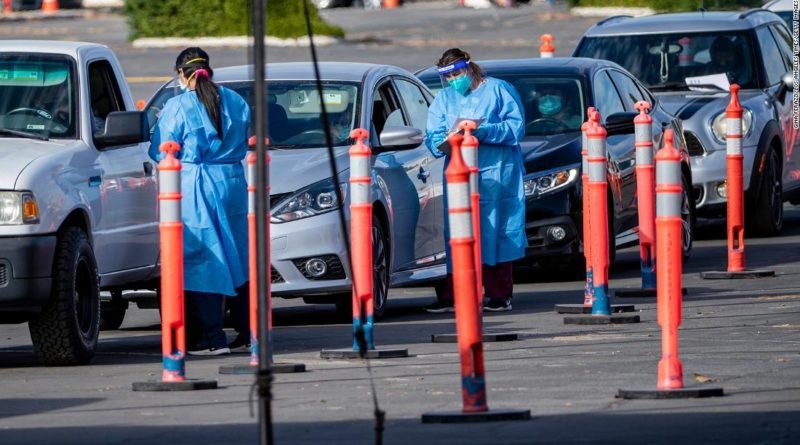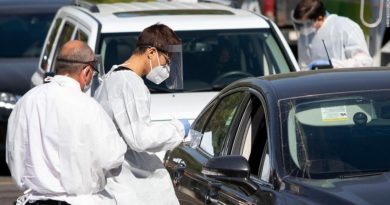US Coronavirus: US sees record Covid-19 cases as CDC advisory group votes to recommend Moderna vaccine
CDC Director Dr. Robert Redfield must accept the group’s recommendation, which would clear the way for vaccines to be administered and add a second vaccine to the country’s arsenal at a crucial moment in the pandemic.
More than 18,000 Americans died of Covid-19 in the past week, and the University of Washington’s Institute for Health Metrics and Evaluation projects that another more than 237,000 Americans will die of Covid-19 in the next three months.
“We have this great news with vaccines, but we also have to look at where we are, which is that our hospitalizations are nearly double from where they were a month ago,” said emergency medicine physician Dr. Leana Wen. “We have a person dying from coronavirus basically every 30 seconds here in the US.”
“Know that there is just so much virus all around the country,” she added, urging Americans to consider not traveling for the holidays. “The entire US is a coronavirus hot spot.”
Officials and experts try to combat vaccine hesitancy
The ACIP’s recommendation of the Moderna vaccine comes as hundreds of Americans across the country have already received their first dose of the Pfizer/BioNTech vaccine, which was authorized for emergency use by the FDA last week.
“This is the beginning of the end,” Adams told CNN Friday night. “Make no mistake about it, it’s going to be a hard couple of weeks. We’ve still got work to do to get over this surge, but I want people to be encouraged.”
He chose to get the vaccine on TV because he wanted the American public to “understand I’ve looked at the data, I’ve worked with the companies and I felt safe getting the vaccine,” he said.
“Really, this is a life and death message for Black people about the coronavirus,” said Dr. Valerie Montgomery Rice.
In a news conference Saturday, Adams said he was more concerned about vaccine confidence than supply, encouraging people who are hesitant to seek out information on the vaccines.
“It’s OK to ask questions,” he said. “What is not OK is to let misinformation or mistrust cause you to make a decision which is going to be bad for your health, or for your family’s health, or your community’s health.”
“This vaccine is almost 100% certain to prevent you or your loved one from getting severe disease,” he said. “It is the way we end this pandemic.”
Moderna vaccine distribution has already started
Distribution of the Moderna vaccine has “already begun,” said Army Gen. Gustave Perna, chief operating officer of Operation Warp Speed, the federal government’s vaccine initiative.
“Boxes are being packed and loaded today,” he said in a news conference Saturday. “Trucks will begin rolling out tomorrow, from FedEx and UPS, delivering vaccines and kits to the American people across the United States.”
There were 7.9 million doses of vaccines allocated this week, Perna said, and the US is “on track” to allocate 20 million doses by the end of the year.
More than 6 million doses of Moderna’s vaccine will be shipped to more than 3,200 sites where they will be administered — far more than the 636 sites that Pfizer’s vaccines were shipped to.
Massachusetts health officials said it wasn’t clear why the dose numbers have changed.
“The Department of Public Health now expects to receive … a little bit more than 145,000 doses of the Pfizer vaccine by the end of December — a number that has been reduced from 180,000. That’s about a 20% decline,” Secretary of Health and Human Services Marylou Sudders said at a news conference.
“At this time, it’s not clear to us why the shipment amounts have been adjusted,” she said.
Massachusetts Gov. Charlie Baker said officials were “certainly frustrated that we won’t be receiving the amount that we expected in the first wave and are working to get clarity on what this means.”
In Saturday’s news conference, Perna attributed the lower allocations to a “planning error,” and said he was taking “personal responsibility for the miscommunication.”
“To the governors, to the governors’ staff, please accept my personal apology if this was disruptive in your decision making and in your conversations with the people of your great state,” Perna said. “I will work hard to correct it.”
An ‘error’ in distribution excludes health care workers
Only seven out of more than 1,300 medical residents and fellows were slated to receive the vaccine and priority was given to faculty and attending physicians who work from home under Stanford Health’s distribution plan, the affiliate reported.
“Our intent was to develop an ethical and equitable process for distribution of the vaccine,” Stanford Health Care said in a statement obtained by the news station.
“We apologize to our entire community, including our residents, fellows, and other front line care providers, who have performed heroically during our pandemic response. We are immediately revising our plan to better sequence the distribution of the vaccine,” the statement said.
CNN has contacted Stanford Health Care for comment.
Video taken by the affiliate showed people in scrubs and PPE demonstrating Friday, and chanting, “First in the room, back of the line.”
“We got it wrong. Let’s get you vaccinated,” Entwistle told the crowd, the San Francisco Chronicle reported. “We’ll correct it.”
Different states, different measures
As state and federal officials gear up for more vaccine shipments, different parts of the country are reporting different Covid-19 trends.
In New York, Gov. Andrew Cuomo said hospitals are at “crisis management” mode and capacity has been added at facilities across the state.
“I believe hospitals are going to be able to manage this,” he said. “We learned a lot in the spring.”
“L.A. County is moving toward becoming the epicenter of the pandemic,” Dr. Brad Spellberg, chief medical officer at LAC + USC Medical Center, warned Friday, adding, “I’m not going to sugarcoat this. We are getting crushed.”
Dr. Thomas Yadegar, the ICU director at Providence Cedars-Sinai Tarzana Medical Center, told CNN that the situation is “by far the worst that it’s been in the past nine months.”
“We need L.A. to turn into a ghost town again,” he said, referencing the early days of the pandemic when the public was largely cooperating with the advice of health officials. “That’s what we need, so that we can try to save as many people and heal as many souls.”
In-person classes can resume at high schools and indoor venues such as movie theaters can reopen with capacity limits and other safety precautions, the governor said. Outdoor group fitness activities and outdoor non-contact sports can also resume.
CNN’s Arman Azad, Jen Christensen, Deidre McPhillips, Hollie Silverman, Ben Tinker, Paul Vercammen and Amanda Watts contributed to this report.




